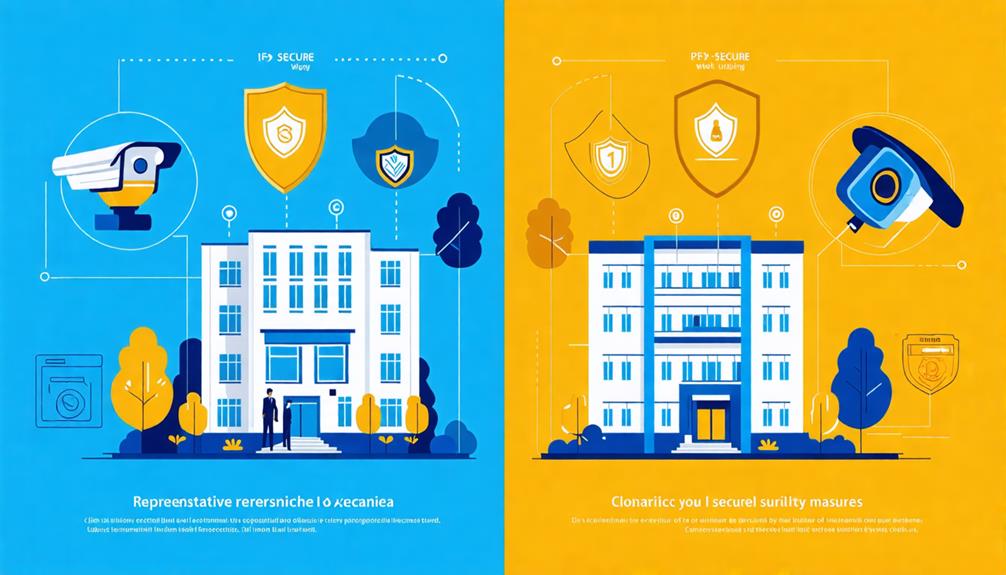Security Clearance (SC) and Baseline Personnel Security Standard (BPSS) have different levels of depth, scope, and objectives.
BPSS is a fundamental pre-employment check for roles of lower risk, verifying the person's identity, immigration status, and criminal records that haven't been spent.
On the other hand, SC is a more comprehensive procedure, involving detailed checks into a person's personal, financial, and criminal backgrounds, suitable for roles that require consistent access to SECRET and sometimes TOP SECRET information.
SC also requires regular renewals and thorough investigations to maintain trustworthiness.
For a more detailed understanding of the different levels of security clearances, one can delve into the specifics of each process.
Definition and Purpose
The Baseline Personnel Security Standard (BPSS) and Security Check (SC) are integral parts of the UK government's personnel security framework, each with unique roles in protecting national security.
The BPSS serves as a pre-employment screening procedure, providing identity verification and executing basic background checks for individuals who need access to government assets. It covers identity verification, employment history analysis, national and immigration status checks, and inspections of unspent criminal records. Even though BPSS is not a formal security clearance, it is necessary for roles within government departments, setting a minimum trustworthiness level for lower-risk positions.
On the other hand, the Security Check (SC) is a comprehensive vetting process required for roles that need access to SECRET and occasional TOP SECRET information. SC clearance includes a detailed investigation into personal, financial, and criminal histories and inquiries into third-party associations. This robust evaluation includes comprehensive interviews and character evaluations to confirm individuals do not threaten national security.
The SC offers a higher assurance level, granting long-term, uncontrolled access to sensitive government assets. BPSS and SC together create a vital stratification in the UK's personnel security approach, designed to match the different risk and sensitivity levels associated with various government roles.
Scope of Background Checks
The range of background checks for BPSS and SC clearance illustrates the degree of vetting required for different access levels within the UK government.
The Baseline Personnel Security Standard (BPSS) mainly concentrates on primary checks, such as identity verification, nationality, and unspent criminal records. This scrutiny level is suitable for low-risk positions, ensuring that individuals fulfil basic security criteria without probing into extensive personal details.
On the other hand, Security Check (SC) clearance demands a much more comprehensive investigation. Apart from the basic checks covered by BPSS, SC clearance also includes detailed examinations of an individual's credit and financial history. Such scrutiny is vital for roles that involve access to SECRET assets, where the potential consequences of a security breach are significantly higher.
Additionally, SC clearance requires an extensive evaluation of an applicant's overall background and potential risks, which includes thorough interviews and assessments of personal associations. This intensive process aims to confirm the integrity and reliability of individuals who require access to highly confidential information.
Duration and Validity
The duration and validity of security clearances have significant differences between BPSS and SC, taking into account the different levels of risk and responsibility.
The Baseline Personnel Security Standard (BPSS) clearance duration is not firmly set, as it is dependent on the organization conducting the screening's guidelines. This flexibility stems from the BPSS's function as an initial check, focusing on basic identity and background verification without the need for a strict renewal schedule or comprehensive ongoing evaluations.
Contrarily, Security Check (SC) clearance adheres to more rigorous validity requirements. Typically, SC clearance requires renewal every 10 years. Yet, for non-List X contractors, this renewal timeframe is reduced to every 5 years to maintain continued compliance and comprehensive reassessment. This regular review is critical for upholding the integrity and security of more sensitive roles.
Additionally, Accreditation Check (AC) clearance, which operates under different stipulations, is valid for only 12 months if there are no continuous data updates from the sponsoring organization. This brief validity period emphasizes the need for continuous data updates and evaluations, in contrast to SC's longer renewal periods.
Consequently, the duration and validity stipulations are carefully customized to the specific security requirements and responsibilities associated with each clearance type.
Access Levels
The SC clearance, due to its thorough vetting process, allows for regular and long-term access to SECRET assets and occasional supervised access to TOP SECRET materials.
On the contrary, BPSS serves merely as a pre-employment screening tool and does not grant access to sensitive data.
The difference between these two clearances highlights the varying depth of background checks and the resulting permissions granted to individuals under each clearance type.
Information Sensitivity Levels
Individuals with SC clearance and those with BPSS are granted different access levels due to the sensitivity of the information they are permitted to handle.
Those with SC clearance can access SECRET assets, which include highly sensitive information with the potential to cause significant damage to national security if leaked. The process to obtain this clearance level involves comprehensive background checks, including an in-depth review of financial history, third-party associations, and a stringent vetting process via Security Service (MI5) records. This intensive process ensures that only those who can be trusted with sensitive information are granted SC clearance.
On the other hand, BPSS offers a basic level of assurance and is mainly used for roles that require access to UK OFFICIAL assets, which are less sensitive. The BPSS process involves identity verification and checks for unspent criminal records. It provides a basic level of security suitable for lower-risk roles and for pre-employment screening. It does not require an examination of financial backgrounds or MI5 checks, but it does ensure that individuals meet the minimum standards for handling official information.
The difference in the sensitivity of information handled under SC clearance and BPSS highlights the varying degrees and rigour of the vetting processes. These are designed to appropriately mitigate risks based on the potential impact on national security.
Asset Access Permissions
Grasping the asset access permissions granted under SC clearance and BPSS is key to understanding the roles and responsibilities attached to each security level.
Security Clearance (SC) allows access to SECRET assets and, under monitored conditions, infrequent access to TOP SECRET assets. This clearance level is usually necessary for roles that require sustained, regular, and independent access to very sensitive information. As such, SC clearance reflects a high trust level, with comprehensive checks on criminal records, credit history, and personal associations.
On the other hand, the Baseline Personnel Security Standard (BPSS) primarily provides access to UK OFFICIAL assets and, in certain circumstances, limited access to UK SECRET assets. BPSS is intended for lower-risk roles where exposure to sensitive information is minimal and generally regulated. The checks for BPSS mainly focus on verifying identity, employment history, and unspent criminal records.
The thoroughness of SC clearance, marked by regular reinvestigations and a high level of assurance, confirms suitability for roles that directly impact national security. BPSS, while significant, does not undergo the same intensive examination and is more suited to roles with lesser sensitivity.
This difference highlights the diverse asset access permissions inherent in each clearance level.
Clearance Depth Comparison
The depth of examination in SC (Security Check) clearance is more comprehensive than that of BPSS (Baseline Personnel Security Standard), providing a higher level of confidence for roles that involve significant access to sensitive data.
SC clearance allows prolonged, unrestricted access to SECRET assets and requires comprehensive checks. These encompass extensive evaluations of credit and financial records, as well as personal and criminal backgrounds, providing rigorous vetting for sensitive roles.
On the other hand, BPSS concentrates on verifying identity and checking for unspent criminal records, mainly ensuring access to UK OFFICIAL assets. It is the baseline requirement for roles with lower risk in government and related sectors. The background checks in BPSS are not as exhaustive as those in SC clearance and are restricted to basic identity and employment history confirmation.
The time taken to obtain SC clearance is also considerably longer, with the clearance requiring a review every ten years to remain valid. Conversely, BPSS does not have a formal expiration date, although regular re-evaluations may be implemented based on organizational rules.
The pronounced difference in clearance depth exemplifies the different levels of access and responsibility that come with each clearance type, highlighting the necessity for rigorous vetting in roles with significant access to sensitive data.
Consequences of Non-Compliance
Not obtaining BPSS clearance can lead to immediate disqualification from roles necessitating access to sensitive government assets, severely affecting career progression. Without this clearance, candidates cannot apply for positions that involve handling classified information, effectively limiting many job opportunities within the government and related sectors.
For employers, hiring individuals lacking the required BPSS clearance can result in serious legal consequences. Organizations may encounter penalties or even the cancellation of government contracts, causing substantial financial and operational impacts. These legal consequences underline the importance of strict compliance with security clearance protocols.
Moreover, non-compliance can pose significant security threats. Unauthorized access to sensitive information can jeopardize national security and the integrity of critical data. These breaches can lead to widespread consequences, affecting not only governmental operations but also public trust.
Companies that do not comply with clearance regulations also risk severe reputational harm. Clients and stakeholders might lose confidence, potentially affecting future business relationships and collaborations. Repeated non-compliance may attract increased attention from regulatory bodies, leading to stricter oversight and possible disruptions in business operations.
Application Process
Navigating the application process for SC clearance and BPSS involves distinct stages, each adapted to the level of security necessary for the job. The SC clearance process is significantly more stringent, mirroring the elevated security requirements for accessing SECRET assets.
- Sponsorship and Initiation:
- SC clearance applications must be endorsed by an employer or organization, ensuring that the process matches specific role requirements.
- BPSS, on the other hand, can be initiated by the person seeking employment, facilitating quicker processing for lower-risk positions.
- Checks and Assessments:
- SC clearance necessitates a comprehensive background check, including a Security Questionnaire, departmental/company records checks, and financial history evaluations.
- BPSS involves standard identity verification and a criminal record check, providing a basic level of assurance suitable for less sensitive roles.
- Residency Requirements and Processing Time:
- SC clearance requires proof of UK residency for 4 out of the last 5 years, which contributes to a longer application timeline.
- BPSS does not impose strict residency requirements, leading to a generally faster verification process.
Candidate Support
Services for candidate support are instrumental in aiding individuals to comprehend the complex prerequisites of SC and BPSS clearances.
These services deliver comprehensive guidance, proposing customised solutions and connection to necessary resources that simplify the application process.
Through a network of security-approved professionals, candidates can manage their expectations effectively and improve their chances of obtaining roles in environments sensitive to security.
Comprehensive Guidance Provided
Guiding the process of security clearance application for SC and BPSS becomes remarkably straightforward with the all-inclusive guidance provided by candidate support services. Such services aim to declutter the complex steps involved, making sure candidates are thoroughly prepared and well-informed throughout the progression. Entities like Value Match Support Services make a considerable contribution in this area by providing a comprehensive array of custom solutions.
Here are three primary ways candidate support services improve the security clearance process:
- Documentation Guidance: Candidates get in-depth instructions for compiling and submitting necessary documents, making sure that all required paperwork is fully complete and correct. This reduces the chance of delays caused by missing or inaccurate information.
- Background Check Preparation: Support services ready candidates for the background checks that form an integral part of both SC and BPSS applications. By knowing what to expect, candidates can address any potential issues in advance.
- Interview Coaching: Candidates are offered insights into the potential questions they may face during interviews, along with tactics to effectively represent their qualifications and background. Such coaching can significantly build up confidence and enhance interview performance.
Prompt and well-informed help from these services can substantially improve the chances of a successful security clearance, decreasing frustration and speeding up the vetting process.
Navigating Clearance Requirements
Understanding the clearance requirements for SC and BPSS requires a comprehensive knowledge of the unique criteria and steps involved, along with well-informed guidance services.
The BPSS acts as a preliminary screening process, checking candidates for basic identity, nationality, and criminal record. This less rigorous procedure enables a more straightforward application, without strict residency prerequisites.
On the other hand, the SC clearance calls for a more comprehensive evaluation. Applicants are required to fill out an exhaustive Security Questionnaire, which might be supplemented by interviews. This clearance mandates a minimum residency in the UK for four out of the last five years, ensuring candidates have a traceable history. The process also examines financial stability and personal associations meticulously, reflecting the confidential nature of SECRET-level access.
Owing to the complexity of SC clearance, candidates gain significantly from detailed guidance services that can clarify each step, making sure they fulfil all requirements.
The need for regular review every ten years further emphasizes the significance of continuous compliance and knowledge of the process. By understanding these differences and utilising available support, candidates can effectively traverse the complex terrain of security clearances.
Access to Resources
Having access to a wide array of resources and support services is crucial for candidates navigating the complex procedures of SC and BPSS clearances. Grasping the unique requirements of these security checks and using the available help can ensure a seamless vetting process.
For those pursuing SC clearance, the intricate nature of background checks calls for a solid support structure. Here are three principal resources that can be of help:
1. Guidance Documents and Online Portals:
Websites of government and agencies offer comprehensive guidelines on the SC clearance process, including necessary documents and interview readiness. These portals ensure candidates have thorough knowledge about every step.
2. Financial and Legal Advisory Services:
In view of the detailed financial history reviews involved in SC clearances, candidates should consider consulting financial and legal advisors. These professionals can assist in managing and correctly presenting personal financial information.
3. Career Development and Training Programs:
Several organizations provide specialized training to help candidates grasp the importance of SC clearance and its effect on career advancement. These programs frequently include mock interviews and character evaluation preparations, crucial for passing the strict SC vetting process.
On the other hand, BPSS candidates primarily require resources concentrated on identity confirmation and employment history checks. While the process is more straightforward, it still demands meticulous attention to detail.
Refusal Reasons
The reasons for denying SC clearance are especially comprehensive and strict compared to BPSS, covering a broad spectrum of factors such as financial health, work history, and personal connections.
SC clearance necessitates a thorough background check scrutinizing an applicant's credit and financial history extensively. Financial inconsistencies, like substantial debt or insolvency, could be grounds for denial. Conversely, BPSS mostly concentrates on substantiating identity and examining unspent criminal records, often disregarding minor financial inconsistencies.
In addition, SC clearance insists on a continuous residency duration of at least four of the previous five years, with employment history gaps potentially leading to denial. This is a stark contrast to the less rigorous inspection in BPSS evaluations, where such gaps may carry less weight.
Serious criminal offenses are another significant reason for denying SC clearance, while BPSS may consider the circumstances and disregard minor offenses. Connections with extreme groups or individuals associated with terrorism can lead to immediate denial of SC clearance. The BPSS procedure does not delve as far into personal associations, indicative of its more narrow focus.
Appeal Process
When SC clearance is denied, applicants can challenge the decision using a defined appeal process supervised by the independent Security Vetting Appeals Panel. The panel mandates applicants to provide required supporting evidence to validate their case. Normally, applicants receive detailed reasons for their rejection, such as residency issues, financial inconsistencies, or hidden criminal records, facilitating them to formulate targeted responses in their appeal.
Key elements of the appeal process encompass:
- Timelines: Applicants must comply with specific timelines when lodging an appeal. Failure to meet these deadlines can lead to the loss of the right to appeal, hence prompt action is critical.
- Transparency and Documentation: It is imperative for applicants to maintain honesty and provide precise information during the vetting process. This involves submitting all required documents that address the reasons for the initial denial.
- Further Actions: If an appeal is not successful, applicants might have additional choices, like reapplying for clearance after dealing with the reasons for the initial denial. This offers a route for applicants to correct issues and possibly obtain clearance in the future.
Conclusion
SC clearances and UK BPSS are distinct in terms of their definition, scope, duration, access levels, and compliance requirements.
SC clearances require detailed background checks and provide higher access levels, which is in line with their purpose to protect national security.
Non-adherence to the regulations of either clearance can lead to serious consequences.
It is crucial for both organizations and individuals in sensitive positions to comprehend these differences to strictly follow security procedures and protect classified information.



